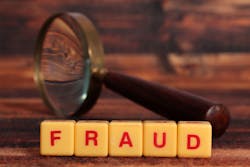Federal Agencies Battle Fraudulent Activity Amid Pandemic
During turbulent times such as natural disasters, donations totaling millions of dollars pour into affected communities seeking relief.
Along with the influx of aid comes unscrupulous activity targeted at the most vulnerable and affected citizens during these times. Enter the National Center for Disaster Fraud (NCDF).
Originally established in 2005 following Hurricane Katrina, the United States Department of Justice's agency "seeks to improve and further the detection, prevention, investigation, and prosecution of fraud related to natural and man-made disasters, and to advocate for victims of such fraud."
Now, the federal, state and local agencies are focusing their efforts on fraud and hoarding schemes related to the COVID-19 pandemic.
In a memorandum dated March 24, Attorney General Bill Barr called for citizens to report any suspicious activity to the NCDF.
"While this crisis has brought out the best in most Americans, there appears to be a few unfortunate exceptions. We will not tolerate bad actors who treat the crisis as an opportunity to get rich quick," he said. "We are beginning to receive reports of individuals using the crisis to hoard vital medical items and then make inappropriate, windfall profits at the expense of public safety and the health and welfare of our fellow citizens. Hoarding and price gouging activities inhibit the government, health care professionals, and the public from implementing critical measures to save lives and mitigate the spread of the virus. These practices also make it harder for our healthcare providers and first responders to resist the spread of COVID-19."
These schemes are primarily internet-based and attempt to funnel assets to the perpetrators. The DOJ has been warning the public of these fraudulent measures:
- Individuals and businesses selling fake cures for COVID-19 online and engaging in other forms of fraud.
- Phishing emails from entities posing as the World Health Organization (WHO) or the Centers for Disease Control and Prevention (CDC).
- Creating fake shops, websites, social media accounts and email addresses claiming to sell medical supplies currently in high demand. When consumers attempt to purchase these supplies, the perpetrators pocket the money and never provide the promised supplies.
- Malicious websites and apps that appear to share Coronavirus-related information to gain and lock access to your devices until payment is received.
- Scammers contacting people by phone and email, pretending to be doctors and hospitals that have treated a friend or relative for COVID-19 and demanding payment for that treatment.
- Soliciting donations to fake charities or crowdfunding sites.
- Medical providers obtaining patient information for COVID-19 testing and using that information to fraudulently bill for other tests and procedures.
- Offering online promotions on various platforms, including social media, claiming that the products or services of publicly-traded companies can prevent, detect, or cure COVID-19, and that the stock of these companies will dramatically increase in value as a result.
“Be on the lookout and report potential scams related to COVID-19,” cautioned Bobby L. Christine, a U.S. attorney for the Southern District of Georgia in a March 25 statement. “Criminals are seeking to take advantage of the current health crisis and are targeting the most vulnerable amongst us. Our office is open for business and committed to working closely with our law enforcement partners to detect, investigate, and prosecute criminal conduct related to COVID-19. Don’t be swayed by fraudsters, and report anything suspicious.”
Maria Chapa Lopez, U.S. attorney, Middle District of Florida echoed to the media: "Unfortunately, there are those who seek to exploit others in times of crisis, without regard to who they harm or the damage they cause. Those criminals should know that we will combine our resources, at every level, to investigate and prosecute them to the fullest extent of the law.”
Hoarding Critical Supplies
Along with schemes to defraud individuals and businesses include the mass hoarding of essential medical supplies such as personal protective equipment (PPE) meant for frontline workers.
President Donald Trump issued Executive Order 13909 on March 18 invoking the Defense Production Act to prohibit the hoarding of select items and simultaneously established a COVID-19 Hoarding and Price Gouging Task Force.
"We want to prevent price gouging, and critical health and medical resources are going to be protected in every form," he said. "Under this directive, the Secretary of Health and Human Services is authorized to designate essential health and medical supplies as scarce. So he’ll designate certain supplies and medical elements as scarce, and that means it will be a crime to stockpile these items in excessive quantities, which is happening to a relatively small degree, we think, but nevertheless it’s happening. We can’t let it happen. And we can’t let them resell them at excessive prices, which some people are doing."
The order designates certain materials as "scarce" such as hand sanitizer, ventilators and other PPE.
Attorney General Barr echoed the sentiments during the press briefing, saying: "I want to stress that we’re not talking about consumers or businesses stockpiling supplies for their own operations. We’re talking about people hoarding these goods and materials on an industrial scale for the purpose of manipulating the market and ultimately deriving windfall profits. If you are — have a big supply of toilet paper in your house, this is not something you have to worry about. But if you are sitting on a warehouse with masks — surgical masks — you will be hearing a knock on your door."
Each of the nation's 93 attorneys offices designated a lead prosecutor to participate in the task force. Leading the initiative is Craig Carpenito, a U.S. attorney in the district of New Jersey.
"We must do the best we can to protect Americans’ rights and safety in this novel and troubling time," Barr concluded.
Reports of suspected fraud and hoarding schemes related to COVID-19 may be directed to the National Center for Disaster Fraud (NCDF) hotline at 1-866-720-5721 or to the NCDF e-mail address, [email protected]. Complainants have the option of remaining anonymous.
About the Author

Stefanie Valentic
Stefanie Valentic was formerly managing editor of EHS Today, and is currently editorial director of Waste360.
